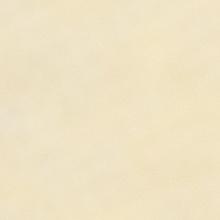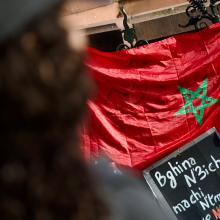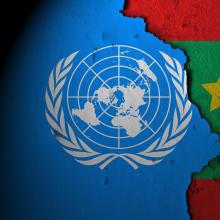February 23, 2023

Taoufik Bouachrine © courtesy of Gulf Center for Human Rights
The undersigned rights groups reiterate their call on Moroccan authorities to immediately end the persecution and detention of prominent independent newspaper editor Taoufik Bouachrine, and scores of Moroccan journalists and human rights defenders imprisoned solely for peacefully exercising their right to freedom of expression.
Today marks the anniversary of the date that Bouachrine, founder and editor-in-chief of the independent daily Akhbar Al-Youm, was arrested on 23 February 2018, after writing editorials critical of high-ranking Moroccan officials and Saudi Crown Prince Mohammed Bin Salman, according to news reports carried by reliable international media outlets, including The Guardian.
A Casablanca court sentenced Bouachrine in November 2018 to 12 years in prison, lengthened to 15 years on appeal by the public prosecutor in 2019, allegedly for sexual assault against several women. Most of them did not turn up in court to testify against him. One of these women, Afaf Bernani, a former reporter for Akhbar Al-Youm, was sentenced to six months in jail for publicly accusing a police officer of falsifying her testimony. She also made it clear, despite police harassment and intimidation, that she never witnessed any attempt on the part of Bouachrine to sexually harass her or rape any of her colleagues. Like other persecuted critical journalists, Bernani went into exile immediately after her release from prison.
In addition, the Pegasus Project revealed that the women who alleged that Bouachrine had sexually assaulted them were, like other prominent journalists including Bouachrine, being targeted by Pegasus spyware which is likely to have been used to blackmail them.
Moroccan authorities ignored the United Nations Working Group on Arbitrary Detention’s 2019 conclusion that depriving Bouachrine of his liberty was unfair. This UN working group also called on the Moroccan government to release him and pay reparations for the harm he suffered. It acknowledged that his trial was marred by due-process violations and considered Bouachrine’s detention as part of “judicial harassment attributable to nothing other than his investigative journalism.”
Moroccan human rights lawyers and African and Arab and international rights groups described Bouachrine’s unfair trial and those of scores of independent journalists and human rights and political activists as flagrant and shameful violations of the Constitution of the Kingdom of Morocco and its commitment to the International Covenant on Civil and Political Rights.
False allegations of sexual assaults and extramarital relations have been abusively and routinely used over the past years by Moroccan authorities as a tool to silence and jail critical journalists and to tarnish their reputation, in a country which offered more room for independent journalism than most Arab countries, a few years before King Mohamed VI ascended the throne in 1999.
Nearly 18 months after the arrest of Bouachrine in 2018, Hajer Raissouni, a critical reporter for Akhbar Al-Youm and a woman human rights defender, was arrested on charges of allegedly “undergoing an illegal abortion” and “adultery”. A Rabat court sentenced her and her fiancé in September 2019 to one year in prison. International condemnation of her imprisonment and solidarity with Raissouni prompted a royal pardon from King Mohamed VI, the following month.
Eight months later, her uncle Soulaiman Raissouni, an investigative journalist and democracy advocate who took over as editor-in-chief of Akhbar Al-Youm following Bouachrine’s incarceration, was “kidnapped in the middle of the street” by the police, according to his wife, former screenwriter Khouloud Mokhtari. He was sentenced in July 2021 to five years in prison, “in absentia and in the absence of his defence team, an almost unique case in the history of trials in Morocco, for ‘sexual assault’,” against a young Moroccan gay man, wrote Mokhtari in an article run by Orient xxi.
Naturally the imprisonment of Bouachrine and Raissouni, coupled with the relentless police harassment and intimidation of its reporters and the intimidation of their respective families, gradually led to the closure of what many journalists and human rights defenders in Morocco deem as the last independent newspaper in the country.
Omar Radi is another prominent investigative journalist who has been, since his arrest in 2020, subject to almost the same charges and flagrant lack of justice and imprisonment. Radi co-founded and co-worked for the critical news website The Desk. He was sentenced in July 2021 to six years in jail for rape and espionage in a trial marred by violations of international standards for a fair trial, according to Amnesty International.
In June 2020, Amnesty International revealed that the phones of Radi, Raissouni and Bouachrine were among those subjected to multiple attacks using a “sophisticated new technique that silently installed NSO Group’s notorious Pegasus Spyware”.
These types of false allegations are not solely used to intimidate and jail critical journalists. In November 2022, former Moroccan human rights minister and lawyer Mohamed Ziane was arrested and was found guilty of charges including insulting and attempting to influence the judiciary, contempt of institutions, adultery, and sexual harassment, according to a statement issued by the public prosecutor’s office. Ziane was among human rights lawyers who repeatedly denounced what he called the unfair trials of Bouachrine and other jailed critical journalists.
Moroccan authorities’ war of attrition against critical journalism started more than 20 years ago by increasingly ordering advertisers close to the government to boycott independent publications, and using the Moroccan judiciary as a tool to silence them and harass their publishers, editors and reporters. Many independent newspapers and news magazines, including Le Journal Hebdomadaire, Nichane, Al-Jarida Al-Okhra and Al-Jarida Al-Oula, Demain and its Arabic version Doumane, were forced to close down under financial pressure and harassment orchestrated by high-ranking government officials.
The pattern of arrests of Moroccan journalists was criticised by the European Parliament (EP) in a resolution on 19 January 2023 that noted that “press freedom in Morocco has been continuously deteriorating, dropping to 135th place in the 2022 World Press Freedom Index” compiled by Reporters Without Borders (RSF).
We welcome the EP resolution, which: “Urges the Moroccan authorities to respect freedom of expression and media freedom, guarantee imprisoned journalists, in particular Omar Radi, Souleiman Raissouni and Taoufik Bouachrine, a fair trial with all due process guarantees, secure their immediate provisional release and cease the harassment of all journalists, their lawyers and families;” and “Strongly condemns the misuse of allegations of sexual assault to deter journalists from performing their duties; believes that this misuse endangers women’s rights.”
We urge the Moroccan authorities not to dispute the EP’s recommendations to uphold freedom of expression, but rather to act accordingly to free all unfairly-imprisoned journalists who are spending years in prison on false charges.
Signatories: Access Now, Africa Freedom of Information Centre (AFIC), ALQST for Human Rights, ARTICLE 19, Association of Caribbean Media Workers (ACM), Cartoonists Rights Network International (CRNI), Center for Media Freedom and Responsibility (CMFR), Center for Media Studies and Peacebuilding (CEMESP), CIVICUS, Committee to Protect Journalists, Detained International, Ettajdid Forum for Citizen and Progressive Thought, FEMENA, Free Media Movement (FMM), Freedom of Expression Institute (FXI), Gambia Press Union (GPU), Globe International Center, Gulf Centre for Human Rights, Human Rights Sentinel, IFoX Initiative for Freedom of Expression- Turkey, International Federation for Human Rights (FIDH), in the framework of the Observatory for the Protection of Human Rights Defenders, International Press Institute (IPI), Media Foundation for West Africa (MFWA), Media Institute of Southern Africa (MISA), Media Watch, Mediacentar Sarajevo, MENA Rights Group, National Press Association (Bolivia), No Peace Without Justice, Pakistan Press Foundation (PPF), PEN America, PEN Canada, PEN International, Reporters Without Borders (RSF), South East Europe Media Organisation (SEEMO), Syrian Center for Media and Freedom of Expression (SCM), Tunisian Association of Democratic Women, Tunisian Coalition Against the Death Penalty, Tunisian Organisation Against Torture, Vigilance Association for Democracy and Civic State, Vigilance Committee for Democracy in Tunisia, Belgium, World Organisation Against Torture (OMCT), in the framework of the Observatory for the Protection of Human Rights Defenders






